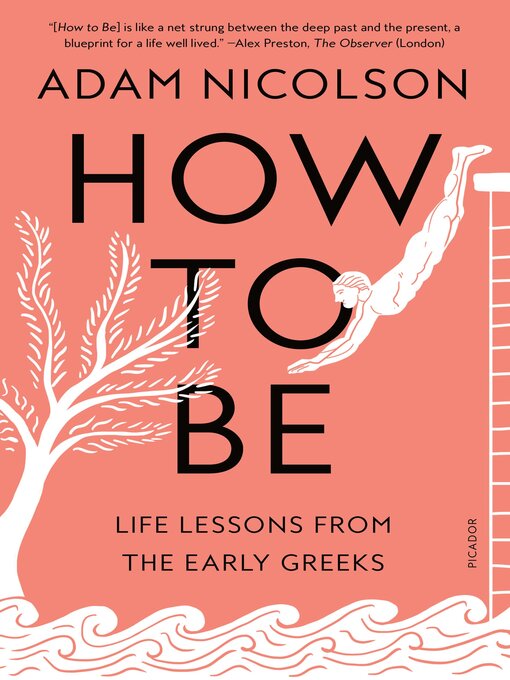Nicolson crafts a geography of the ancient world and a brilliant exploration of our connections to the past.
What is the nature of things?
What is justice? How can I be myself?
How should we treat each other?
Before the Greeks, the idea of the world was dominated by god-kings and their priests. Twenty-five hundred years ago, in a succession of small eastern Mediterranean harbor cities, a few heroic men and women decided to cast off mental subservience and apply their own thinking minds to the conundrums of life.
These great innovators shaped the beginnings of western philosophy. Through the questioning voyager Odysseus, Homer explored how we might navigate our way through the world. Heraclitus, in Ephesus, was the first to consider the interrelatedness of things. Xenophanes of Colophon was the first champion of civility. On the Aegean island of Lesbos, the early lyric poets Sappho and Alcaeus asked themselves, "How can I be true to myself?" On Samos, Pythagoras imagined an everlasting soul and took his ideas to Italy, where they flowered again in surprising and radical forms.
The award-winning writer Adam Nicolson travels with us through this transforming world and asks what light these ancient thinkers can throw on our deepest preconceptions. Enhanced with maps, photographs, and artwork, How to Be is an expedition into early ideas. Nicolson takes us to the dawn of investigative thought and makes the fundamental questions of the ancient philosophers new again. What are the principles of the physical world? How can we be good in it? And why do we continue to ask these questions? It is an enthralling, exhilarating journey.
-
Creators
-
Publisher
-
Release date
October 17, 2023 -
Formats
-
Kindle Book
-
OverDrive Read
- ISBN: 9780374610111
-
EPUB ebook
- ISBN: 9780374610111
- File size: 133507 KB
-
-
Languages
- English
-
Reviews
-
Publisher's Weekly
Starred review from July 3, 2023
Historian Nicolson (The Life Between the Tides) illuminates in this meditative account the vital influence geography had on the evolution of Greek philosophy from the 11th to the 5th centuries BCE, arguing that places gave rise to frames of mind that served as wellsprings of new ideas. Drawing on archaeology, literary accounts, and his own travels, Nicolson contends that Greek philosophers’ focus on fluidity, exchange, and connectedness derived from the growth of Iron Age port cities across the Aegean. In support of this idea, he recounts a well-worn parable of the philosopher Thales, who lived in the port city of Miletus in the 6th century BCE; Thales tripped into a well while examining the stars and was laughed at by an enslaved girl who chided him for not being able to see what was directly in front of him. According to Nicolson, this story illustrates how the tensions of the slave trade, the basis of Miletus’s coastal prosperity, led to the origins of philosophy’s self-conscious divide between the study of an ideal cosmos and an unideal reality. Elsewhere, Nicolson posits that the poet Sappho was inspired by the long absences of a maritime world to develop the idea of a distinct, isolated self that longs for connection. (“And her light/ stretches equally/ over salt sea...// But she goes back and forth remembering.”) Lyrical and insightful, this graceful analysis is an alluring must-read. -
Kirkus
Starred review from September 1, 2023
A dazzling meditation on the quest of the early Greek philosophers to understand the world. Most readers have heard of the most famous Greek philosophers--Plato, Aristotle, Socrates--but Nicolson, author of Life Between the Tides and Why Homer Matters, goes back further in time to examine the Iron Age philosophers: Sappho, Thales, Pythagoras, and Heraclitus, among others. His premise is that the Greeks of this era, from roughly 700 to 500 B.C., developed their agile way of looking at the world from their seaborne way of living and trading. The author calls it the "dolphin mind," an attitude that rejected the authoritarianism of the past in favor of a "mindset of entrepreneurial, adventuring people...a form of mercantile courage, of reliance on fluidity." Author of many award-winning books on literature, nature, sailing, history, Nicolson is an excellent writer, his work shot through with wonder, erudition, and curiosity. He effortlessly pulls together strands of history, philosophy, language, art, culture, and archaeology. He chronicles his travels to present-day sites and ruins of the cities these philosophers called home, from Turkey's western coast to Sicily, and re-creates both everyday city living and the philosophers' struggles to understand the gears in the machine of existence. He organizes chapters around existential questions--What Is Existence Made Of? Is the World Full of Souls? Does Love Rule the Universe?--and the text is accompanied by reproductions of Greek art and artifacts, including pottery, coins, statues, and entire temples. These are all tangible clues to how these philosophers worked, played, and thought. Nicolson acknowledges the brutal side of Greek life, and he doesn't shy away from the ugly realities of slave life, from endless, backbreaking manual labor to forced prostitution. Much deeper than a self-help book, this work returns to the past and shows how the ancients' struggles were in many respects our own. A must-read for anyone interested in philosophy, history, travel, art and the quest of human beings to comprehend themselves.COPYRIGHT(2023) Kirkus Reviews, ALL RIGHTS RESERVED.
-
Formats
- Kindle Book
- OverDrive Read
- EPUB ebook
subjects
Languages
- English
Loading
Why is availability limited?
×Availability can change throughout the month based on the library's budget. You can still place a hold on the title, and your hold will be automatically filled as soon as the title is available again.
The Kindle Book format for this title is not supported on:
×Read-along ebook
×The OverDrive Read format of this ebook has professional narration that plays while you read in your browser. Learn more here.


